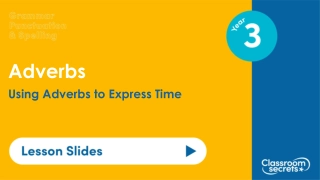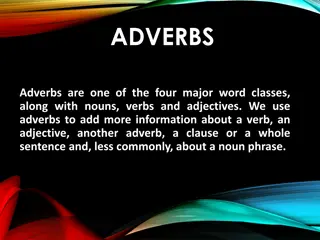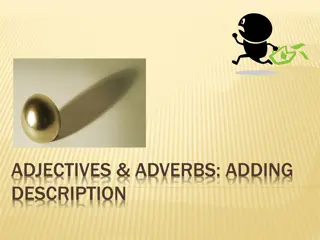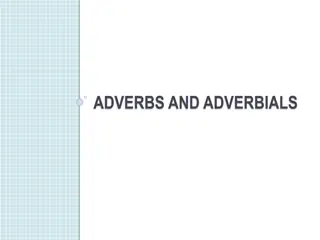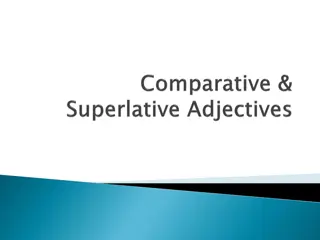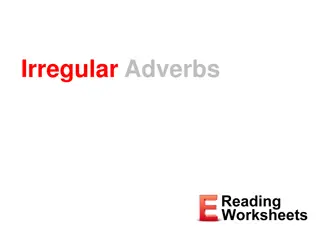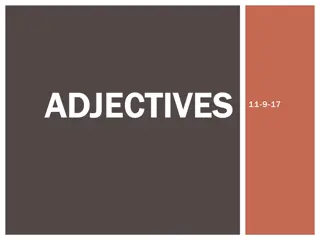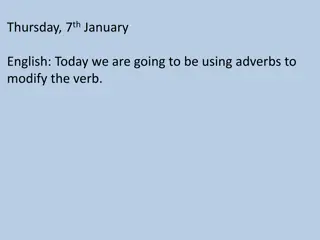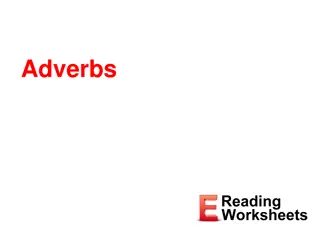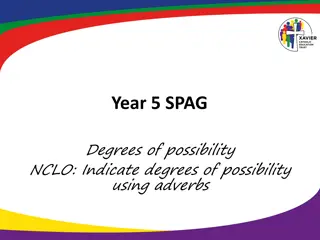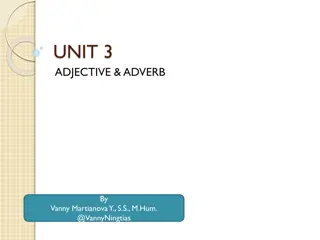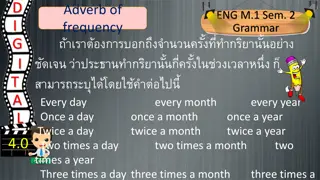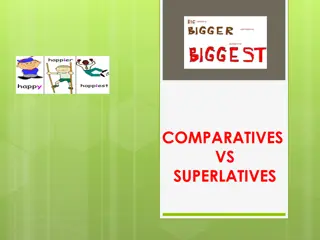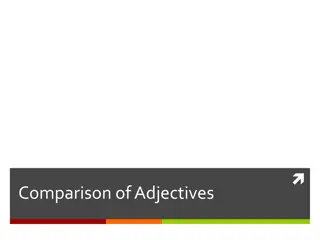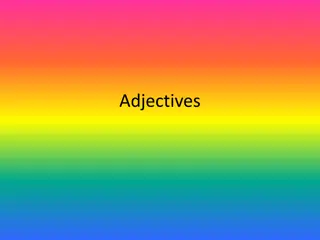Understanding Adverbs: Expressing Time in Language
Explore the role of adverbs in expressing time, differentiate between adverbs of manner and adverbs of time, and practice identifying and using adverbs in sentences. Learn how adverbs provide additional context to actions and discover examples of adverbs of time. Enhance your understanding of how ad
4 views • 42 slides
Learning Adverbs, Comparatives, and Superlatives in English Grade 6 Lesson 3
Enhance your English skills in Grade 6 with Lesson 3 on adverbs of frequency, comparative and superlative forms, and possessive pronouns. Practice choosing the correct adverbs, filling in the gaps with adjectives, and mastering the use of quantifiers. Improve your language proficiency and expand you
8 views • 12 slides
Understanding Notional Parts of Speech: Adjectives and Adverbs
Exploring the notional parts of speech, this text delves into the properties and functions of adjectives and adverbs. Adjectives describe the qualities of substances, while adverbs characterize actions or qualities. Adjectives can be qualitative or relative, with degrees of comparison, while adverbs
1 views • 25 slides
Understanding Adverbs: Usage and Placement
Adverbs play a crucial role in enhancing the information provided by verbs, adjectives, and other adverbs in a sentence. They can indicate when, where, or how an action is performed, or express the quality or degree of an action. It is important to correctly place adverbs in a sentence to avoid chan
0 views • 9 slides
Comparative Adjectives: Short Adjectives and Usage
Comparative adjectives are used to compare two things, such as the length, size, or appearance. They can be formed by adding -er to short adjectives like big, long, thin, short, and pretty. When the adjectives end in -y, change the -y to -i and add -er. Use "than" to compare two things in the same s
5 views • 10 slides
Understanding Adjectives and Adverbs: Rules and Examples
Enhance your grammar skills by learning about adjectives and adverbs. Adjectives modify nouns and pronouns to describe what kind of person, place, or thing, while adverbs modify verbs by expressing manner, place, time, degree, or number. Explore different types of adverbs and examples to grasp their
0 views • 14 slides
Understanding Adjectives and Adverbs for Descriptive Writing
Learn how adjectives and adverbs enhance writing by adding specific details about people, objects, and actions. Adjectives modify nouns to make sentences more descriptive, while adverbs provide additional information about verbs or adjectives. Discover the importance of using these descriptive words
0 views • 26 slides
Learning About Adjectives Through Activities
Explore activities to learn about adjectives such as listing nouns in pictures, identifying adjectives, and creating sentences using adjectives. Understand how adjectives enhance descriptions and provide more context to nouns.
0 views • 13 slides
Understanding Adverbs and Adverbials in English Grammar
Adverbs modify various elements in a sentence, such as verbs, adjectives, and even whole clauses. Not all adverbs end in "ly," and they can belong to categories like time, place, degree, and discourse markers. Adverbials are strings of words that modify functions, including prepositional phrases, no
1 views • 9 slides
Learn to Use Adverbs in Independent Writing for Year 1 English
Explore the world of adverbs with engaging activities like identifying adverbs in sentences and using them creatively in independent writing. Enhance language skills as you describe actions with adverbs like quietly, cheerfully, skillfully, and more. Access lesson materials and practice adverbs with
0 views • 15 slides
Mastering Adverbs of Manner: Transforming Adjectives into Adverbs
Welcome to week 13 where we delve into Adverbs of Manner. Learn the rules of transforming adjectives into adverbs effortlessly, with examples and visual aids. Understand the nuances between adjectives and adverbs, and practice adding -ly, changing -y to -i and more. Engage actively and enhance your
0 views • 15 slides
Mastering Adjectives and Adverbs: Rules and Examples
Learn how to form adverbs from adjectives using different spelling rules. Understand how to add '-ly' to adjectives, deal with adjectives ending in '-ic', '-le', '-ll', 'ue', and 'y', and grasp exceptions like 'shy' and 'sly'. Enhance your grammar skills with clear explanations and visual examples i
0 views • 11 slides
Understanding Adjectives and Adverbs Usage in English
Exploring the correct usage of adjectives and adverbs in English grammar, covering topics such as when to use adjectives vs. adverbs, how to describe actions and linking verbs, and the importance of proper comparisons. Examples and explanations provided to enhance understanding.
0 views • 6 slides
Comparative and Superlative Adjectives Usage Guide
Discover how to form and use comparative and superlative adjectives to compare two or more nouns. Learn the rules for adding -er or -est endings, using "more" or "most," and irregular adjectives like "good" and "bad." Follow step-by-step formulas to create sentences with comparative and superlative
0 views • 11 slides
Understanding Irregular Adverbs in English Grammar
Explore irregular adverbs, flat adverbs, irregular adverbs of degree, negatives as adverbs, and the difference between "good" and "well" in English grammar. Learn how irregular adverbs modify verbs, adjectives, and other adverbs, with examples and visual aids provided.
0 views • 11 slides
Understanding Adjectives and Adverbs as Modifiers in English
Explore the role of adjectives and adverbs as modifiers in English language. Learn how adjectives describe nouns and pronouns, while adverbs modify adjectives, verbs, or other adverbs to show how, where, when, or to what degree an action is done. Understand the difference between adjectives and adve
0 views • 21 slides
Mastering Adverbs of Frequency for Daily Activities
Learn how to use adverbs of frequency to describe the frequency of daily activities with examples like playing the guitar, reading a book, running, and going to the cinema. Understand the usage of adverbs like always, usually, often, sometimes, rarely, and never in expressing routine actions. Improv
0 views • 18 slides
Learning Descriptive Adjectives: Forms, Agreement, and Position
This lesson covers the forms, agreement, and position of descriptive adjectives, including regular and irregular adjectives. You will learn about the pronunciation of adjectives and their usage with examples. Understanding the agreement of adjectives with nouns in gender and number is essential. Pra
0 views • 6 slides
Understanding Adjectives: Types and Examples
Learn about adjectives, words that modify or describe nouns or pronouns. Explore different subsets of adjectives such as proper adjectives, articles, demonstrative adjectives, and other special adjectives. Identify adjectives in sentences and understand how they tell what kind, how many, or which on
0 views • 10 slides
Understanding Adjectives and Adverbs Usage: Common Errors and Differences
Adjectives modify nouns and pronouns, while adverbs modify verbs, adjectives, and other adverbs. Learn the differences, common errors, and how to distinguish between commonly confused adjective/adverb pairs like real/really and sure/surely. Enhance your understanding of when to use each correctly.
0 views • 7 slides
Understanding Adjectives, Adverbs, and Linking Verbs in Writing
Learn about the significance of linking verbs in expressing a state of being, the role of adjectives in modifying nouns, and the function of adverbs in modifying verbs, adjectives, and adverbs. Explore examples of using "bad" and "badly," as well as "good" and "well" correctly. Test your understandi
0 views • 8 slides
Understanding Adverbs by Using Them in Sentences
Learn about adverbs and how they modify verbs through examples and exercises. Practice identifying adverbs in sentences and create your own sentences using adverbs to describe actions. Enhance your English language skills in a fun and interactive way.
0 views • 9 slides
Understanding Adverbs: Usage and Examples
Explore the role of adverbs in modifying verbs, adjectives, and other adverbs. Learn how to turn adjectives into adverbs, differentiate between "good" and "well," and use adverbs in sentences correctly. Discover common examples and get insights into how adverbs enhance the clarity and effectiveness
0 views • 10 slides
Understanding Adverbs in English Grammar
Delve into the world of adverbs with this presentation created by Stephens Luke Malaker, Principal of PRAN-RFL PUBLIC SCHOOL. Learn about how adverbs modify verbs, adjectives, and other adverbs. Explore examples and understand the various ways adverbs can modify verbs. Discover the position of adver
0 views • 34 slides
Understanding Adverbs and Their Types
Adverbs play a crucial role in modifying verbs, adjectives, and other adverbs to express various qualities or circumstances. They can be confused with adjectives but serve different purposes by indicating time, place, manner, or quality in a more concise manner. Adverbs are classified into categorie
0 views • 16 slides
Understanding Degrees of Possibility Using Adverbs
Explore the concept of degrees of possibility in English grammar by using adverbs. Learn about different types of adverbs, how to indicate degrees of possibility using adverbs, and examples of adverbs that show varying levels of certainty. Discover modal verbs that can also express different levels
0 views • 7 slides
Understanding Adverbs of Possibility and Probability
Adverbs of possibility and probability indicate the likelihood of an action or state occurring. They include words like "certainly," "indeed," "perhaps," "probably," and "maybe." These adverbs can be positioned at the beginning of a clause or before the main verb, depending on the context. Understan
0 views • 5 slides
Understanding Adjectives and Adverbs in English Grammar
Adjectives modify nouns and appear after "to be" verbs or before nouns, while adverbs modify verbs and typically follow sense verbs. Suffixes like -ful, -less, -y, -ish, -ic, -ive, -al, -ous, -ent can form adjectives. Adjectives can be derived from verb+ing and verb+3 (-ed) forms, as seen in example
0 views • 21 slides
Understanding Adverbs: Types and Functions Explained
Adverbs modify verbs, adjectives, or other adverbs in a sentence, providing information about time, manner, place, or degree. Learn about different types of adverbs - Time, Manner, Place, and Degree - with examples and their functions. Discover how adverbs enhance the meaning of a sentence with word
0 views • 19 slides
Mastering Adverbs and Adverbials: A Comprehensive Guide
Enhance your understanding of adverbs and adverbials with visual aids and practice exercises. Learn how adverbs describe verbs and adverbials provide details about when, where, or how actions occur. Practice identifying and using adverbs and adverbials in sentences with the help of provided sheets.
0 views • 8 slides
Understanding Adverbs in English Grammar
Explore the world of adverbs in English grammar through this comprehensive guide. Learn how adverbs describe actions and their various forms, including regular and irregular adverbs. Discover how adverbs can have the same form as adjectives and how intensifiers like "very" and "really" enhance the s
0 views • 48 slides
Understanding Adverbs of Frequency in English Language Studies
Explore the usage of adverbs of frequency such as "every day," "twice a month," and "once a week" in English grammar through exercises and examples. Enhance your understanding of how to construct sentences using present simple tense to describe regular activities. Practice placing adverbs in sentenc
0 views • 53 slides
Understanding Comparatives and Superlatives in Adjectives
Learn about comparatives and superlatives in adjectives, including examples of short and long adjectives, as well as irregular forms. Discover how to form comparative and superlative adjectives with one-syllable and multi-syllable words. Gain insights into common irregular adjectives like good, bad,
0 views • 7 slides
Understanding Adjective Comparison in English Grammar
Explore the rules for forming comparative and superlative forms of adjectives in English grammar. Learn about irregular comparisons, one-syllable adjectives, adjectives ending in -y, -ow, -le, -er, multi-syllable adjectives, hyphenated adjectives, and more. Discover the nuances of adjectives with on
0 views • 14 slides
Understanding Superlative Adjectives in English
Superlative adjectives are used to describe objects at the highest or lowest quality limit. Learn how to form superlatives, including adding -est or using "the most" with different types of adjectives. Special forms exist for adjectives like good, bad, and far. Practice forming superlatives for vari
0 views • 10 slides
Understanding Degrees of Comparison in English and Latin
Degrees of comparison in English involve three forms of adjectives - positive, comparative, and superlative. Adjectives are compared by adding suffixes or using adverbs. In Latin, comparisons are formed with regular, irregular, and incomplete adjectives. Comparative and superlative forms differ base
0 views • 8 slides
Understanding Adjectives and Nouns with Infinitives and Gerunds
Exploring how adjectives are used with infinitives and gerunds in English grammar, including examples such as adjectives of certainty, willingness, importance, and necessity. The presentation covers adjectives modifying infinitives or gerunds, along with the use of prepositions. It also discusses ho
0 views • 10 slides
Understanding Adjectives in Ph.D. English Course by Prof. Dr. Ahmed Ali Mohammed
Explore the fundamental concepts of adjectives in an advanced English course for Ph.D. students, led by Prof. Dr. Ahmed Ali Mohammed. Learn about the various categories of adjectives such as color, size, shape, feelings, quantity, qualities, appearance, and condition. Enhance your understanding of h
0 views • 17 slides
Understanding Adjectives in English Grammar
An adjective is a word that describes, identifies, modifies, or quantifies a noun or pronoun. Learn about descriptive, demonstrative, possessive, and quantifying adjectives along with examples. Understand the placement of adjectives in sentences and differentiate between proper and common adjectives
0 views • 23 slides
Understanding Adverbs: A Comprehensive Lesson
Today's lesson focuses on adverbs, describing how, where, or when something is done. The students will learn about different kinds of adverbs, their formation from adjectives, functions, and examples of adverbs of place and frequency. The lesson aims to improve the students' understanding of adverbs
0 views • 14 slides
